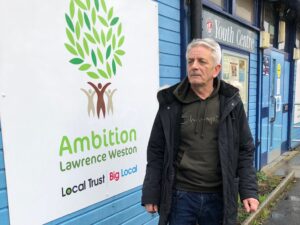What does a ‘just transition’ mean to those of us from disengaged, disempowered, deprived, ‘left behind’ communities? Not a lot. Some residents where I live aren’t even sure what the words are about.
If they mean ‘fair’, that means something that works for everyone – so whatever opportunities that come from our move to a greener way of life must come to all. A transition where upskilling and training are offered to all. Where the economic benefits benefit all. And where new technologies and resources are accessible to all.
For this to happen, voices from all communities must be heard, and the language has to change to ensure it means something to everyone, and we all understand it.
Words matter
 People like me need a seat at the table. We need to be included, to feel that our opinions are valued, that we are listened too, that we are being considered, and that people and organisations from different backgrounds, cultures, countries, and privilege truly want to ensure a fair transition happens.
People like me need a seat at the table. We need to be included, to feel that our opinions are valued, that we are listened too, that we are being considered, and that people and organisations from different backgrounds, cultures, countries, and privilege truly want to ensure a fair transition happens.
I think, to create meaningful participation with communities like mine, the current climate narrative needs to change. We should focus on what local residents feel are their most pressing priorities – like heating their homes, cheaper travel, economic improvements through delivering new technology, and training and upskilling locally so it’s more accessible to people like us. Start to do that and participation in reducing carbon emissions will happen in communities like mine.
Knowledge is power
When that happens, we all build knowledge, understanding and awareness. This helps us better understand the climate emergency and reduce our negative impact.
At COP26 last November, I attended talks and events with people from all over the world. Many were faced by serious, life-threatening challenges. There I was, moaning about having to pay a congestion charge or the cost of a new boilers, when there are continents flooding, forests burning, fishermen who can’t fish because the water pollution has killed everything. But it’s all relative. I am limited in what I can do to address climate issues, but I – we – can do something. In fact, we can do loads. And we have to, whether it’s an ‘inconvenience’ or not.
Developed countries like ours must practice what we preach, especially if we expect others to follow. That starts with communities like mine and people like me. I want a positive story to tell my grandkids. I don’t want to look back and know I was there when we failed to save the planet.
Climate change Community Environment Inequality Local economies Social action climate change climate crisis communities community families family just transition net zero Posted on: 23 September 2022
